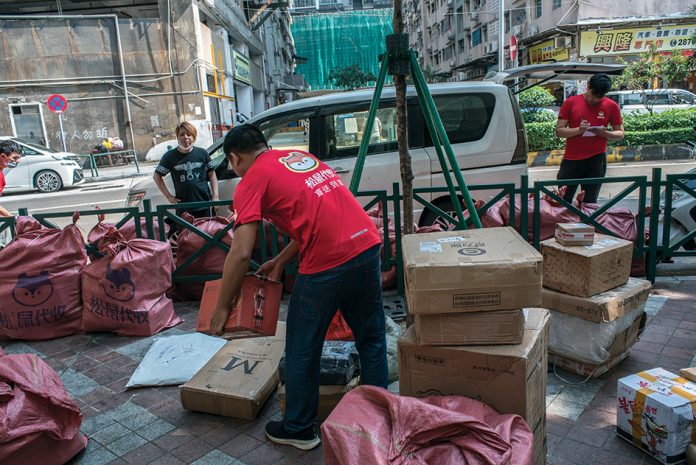The COVID-19 outbreak might accelerate the development of e-commerce here, as the business of some e-commerce operators has already spiked
From mega resorts in glamorous Cotai, to small shops in old neighbourhood districts, all kinds of businesses have been struggling over the past few months, as the hustle and bustle which used to animate the city has long gone, leaving behind a trail of desolation in the aftermath of the coronavirus outbreak that led to COVID-19.
But not all have been embroiled in this business turmoil, as people are trying to avoid going out and staying at home as much as possible — those incorporating technology in their operations apparently have an edge in this predicament, which might pave the way for the acceleration of e-commerce development here.
Aomi, one of the largest local food delivery mobile platforms, has seen its business ramp up during this pandemic. The founder and CEO of Macau’s answer to Chinese food delivery service giant Meituan Dianping and international players like Foodpanda and Deliveroo, Acen Jiang Haitao noted: “At the peak of the COVID-19 crisis, between the end of February and early March, our platform saw a year-on-year increase of over 50 percent in the number of orders, as people spent more time indoors at home.”
Through Aomi, people can order their food from local eateries and restaurants with just a few clicks and have the food delivered to their homes; plus, they can get coupons for discounts on dining or shopping experiences once this situation gets resolved. According to the information provided by the company, the platform handled an average of over MOP 40 million in orders per month last year, and the accumulated number of users topped the 1 million benchmark.
“Even though there are signs that the emergency is starting to subside, our platform continues to see a rise in the number of orders, between 30 percent and 40 percent more when compared with the same period last year”, says Mr. Jiang. The city has so far reported a total 45 COVID-19 cases, the first case being on January 22, but there have been no new confirmed cases since April 8.

More workers
Like Meituan Dianping in Mainland China and many other delivery companies in the world, Aomi launched the so-called ‘no-touch’ delivery initiative on January 28 to limit physical contact between customers and delivery people during the pandemic. The delivery people drop off the food at locations designated by the customers, such as doorsteps and front desks in lobbies, then the customers can pick it up later.
Mr. Jiang adds that the company has also forked out over MOP 1 million to purchase protective supplies like masks and sanitisers for their staff to ensure their hygiene and health, enhancing Aomi’s short-term operating costs.
To tackle the surging demand, the platform has also employed dozens of new part-time and full-time delivery people. “It’s actually not very hard to recruit additional delivery people, because many occupations in various industries have been hard hit by the virus outbreak, for example taxi drivers”, he explains. “They needed other jobs to sustain their livelihoods.”
Online groceries
Aomi is among the businesses that have enjoyed growth in what is deemed as ‘the worst public health crisis in a generation’. The local online grocery platform, bluBasket, is also one of the incidental beneficiaries. From vegetables, to fruits, meat, snacks, beverages, skincare and other types of products – users can have their goods delivered to their homes as soon as two hours after placing an order from the platform, which was founded in early 2018.
“We’ve seen our business jump by about 10-20 percent year-on-year during the pandemic”, says Jovi Chen, co-founder of the eponymous firm. “Sanitising products and cleaning products are the current best sellers.”
While the pandemic represents a business growing opportunity for the platform, it has also imposed a few challenges upon its operations. “Many residential estates have stopped outsiders from entering since the onset of COVID-19, which means we can only deliver the groceries to the lobby on the ground floor and that the customers will then have to pick them up themselves”, Mr. Chen explains. “Some customers don’t like this arrangement, so they aren’t using our service.”
To minimise movement across the border in light of the virus outbreak, authorities issued a policy as early as February for all non-resident workers who hope to enter Macau but have visited Mainland China in the past 14 days prior to their entry, to go into a two-week quarantine in nearby Zhuhai. Since he usually employs some mainland Chinese workers too, Mr. Chen notes that bluBasket operations were also slightly impacted in the beginning, given the lack of manpower.
However, as it seems that life will return to normal soon — at least in the Greater China region with fewer COVID-19 cases in the past few weeks —, Mr. Chen expects his business to keep the momentum. “After this pandemic, more people in Macau will have gotten or will get used to online shopping, which will be helpful for our business”, he adds.
“Albeit the easing signs of the pandemic, our platform continues to see a rise between 30 percent and 40 percent in the number of orders now compared with the same period of last year” – Acen Jiang Haitao, founder and CEO of Aomi

E-payment
Despite the government pushing for years, developing e-commerce here has taken a while, due to the residents’ reticence and the limited choice of e-payment methods available. But this is slowly changing. According to the 2019 Internet Usage Trends in Macau, an annual study carried out by the Macau Association for Internet Research and the eRS e-Research Lab, the rate of online shopping among local adult netizens reached 63 percent last year, increasing by 9 percent from the previous year and more than doubling from 30 percent in 2019. The online shopping rate was even higher in the age group between 18-34 (80 percent) in 2019, the study said, adding that clothing, daily necessities, and household items were the mostly sought-after products.
There have also been more means of e-payment available in the territory. Alipay — the third-party mobile and online payment arm of Chinese e-commerce giant, Alibaba Group — launched a brand new MOP-denominated digital wallet for the city in September of last year; the Macau version has so far attracted 150,000 users, or nearly one-fourth of the city’s population. In addition, over 10,000 merchants in the city now accept the e-wallet.
The government also advocates the usage of e-payment, in a bid to drive up the local economy dampened by the virus outbreak, saying that shopping vouchers will be distributed to each resident in two rounds — each resident will receive MOP 3,000 between May and July, and MOP 5,000 between August and December. The vouchers will be in the form of Macau Pass stored value cards, which were developed by the eponymous company that also boasts the MPay e-wallet. Authorities have justified the usage of Macau Pass cards as shopping vouchers to facilitate the prevalence of e-payment among local merchants and residents.
“After this pandemic, more people in Macau will have gotten or will get used to online shopping, which will be helpful for our business” – Jovi Chen, co-founder of bluBasket
Shopping festival
Aomi’s Mr. Jiang has also bet that this growing trend for more residents to shop online will continue after the end of the crisis. Macau e-Media Development Co Ltd, which develops the food delivery platform, has recently partnered with the Macau Convention & Exhibition Association and Nam Kwong Exhibition Service Co Ltd to organise what is regarded as ‘Macau’s first online shopping festival’. The festival, which will take place between May 28 and June 3, is basically an online platform which has been created in the hope that over 1,000 local merchants will gather to sell a variety of products and services, including groceries, electrical appliances, souvenirs, kitchenware, hotel packages, vehicles, properties and so on.
Nam Kwong Exhibition Service, an affiliate of state-owned Nam Kwong Group, noted that there will be a series of themed events during the festival to entice the participation of local merchants. “This online shopping festival…could strengthen the knowledge of e-commerce among local small- and medium-sized enterprises, and help SMEs explore new market opportunities, thus enhancing their competitiveness”, the company said, expecting the seven-day festival to result in a business turnover of over MOP 50 million for local merchants.
Macau e-Media Development mainly provides the technology for setting up the platform for the festival. “For instance, customers can use all the e-payment methods incorporated in Aomi during the festival”, Mr. Jiang illustrates.
“The merchants available on Aomi now are mainly in the food and beverage sector…so we hope to make good use of this chance to diversify our platform, covering merchants operating in more fields”, he says, adding that the company might help organising more online shopping festivals in the future depending on what the outcomes will be this time.
Overall, he is upbeat about the future of e-commerce here. “There will definitely be more people who have cultivated a habit of online shopping, after COVID-19”, he says.
























